Enab Baladi’s Investigation Team
Murad Abdul Jalil | Riham al-Assaad | Mohamed Homs | Ahmed Jamal
Discussions about reconstruction in Syria have been on the rise for months in the corridors of official state buildings in countries involved in the Syrian file. The consultations vary according to each country’s political orientation and strategic interests, as Russia and Iran support al-Assad’s regime, whereas other states claim to be looking for a political solution in accordance with the Geneva Peace Talks, such as the European countries and the United States.
These talks come after the developments that the Syrian scene witnessed during the past year both on the ground and at the military level. The most important of these was the decline of military operations between al-Assad forces and the opposition factions after the Syrian regime, backed by Russia and Iran, controlled large areas that were previously dominated by the opposition, starting from Eastern Ghouta and south of Damascus to reach Daraa in the south.
Countries wishing to participate in the reconstruction process are waiting for the war to end and for the launch of a final agreement on an inclusive formula to the political solution to start reconstruction projects and send its companies to Syria in order to secure a share in the investments, since the current government is unable to rebuild the country by itself.
In this file, Enab Baladi tries to shed light on the impact of the delay of the political solution on the launch of reconstruction in Syria, and the most prominent countries that may participate in such process under al-Assad’s rule or in case of the regime’s departure.
Sharing quotas and the political solution
Reconstruction in Syria is not only an economic process, but also a political one that will lead the dominant party to extend its control and long-term political power. Most of the countries involved in such process are seeking to be influential in Syria’s future.
The Syrian researcher, Sokrat al-Alou, a specialist in political economy and international relations, ruled out the fact that sharing the reconstruction rations is the reason which delays and hinders the political solution. The main obstacle is the attempt made by Russia to impose a solution according to the Sochi conference’s vision. Such plan implies keeping al-Assad’s regime, granting the Syrian State full control over all the usurped lands and changing the Constitution, in addition to holding new elections. Meanwhile, the US and the European and Gulf States want a transitional governing body in accordance with the Geneva decisions and resolution 2254.
Al-Alou also considered, in an interview with Enab Baladi, that there are several factors that are more important than reconstruction, which makes Syria a battlefield. These factors include, most notably, the Iranian presence which is destabilizing the region, especially Israel and the Gulf states, in addition to the Turkish concerns over the Kurds who will not withdraw from Syria before resolving the crisis with the US and securing their borders. Moreover, the US controls a large piece of Syria that contains oil resources and the Euphrates Dam, the largest generator of electric power in the country.
For his part, the Syrian oppositionist and head of Cairo Platform, Firas al-Khalidi, believes that the sharing of quotas among the major powers does not constitute any obstacle in the way of the aspired political solution and its ratification. On the contrary, reaching a consensus between powerful countries over the division of interests in Syria is actually beneficial for Syria and the Syrian people. The consensus will make the deployment of security and safety an inevitable reality imposed by the international presence on the Syrian soil, even if such presence is in the form of multinational companies concerned with the reconstruction and re-investment of Syria’s resources.
Al-Khalidi pointed out that the mechanism of action employed by these companies, with the launch of its activities inside Syria, runs counter to any repressive monopolistic political system that Syrians fear today to be re-imposed on them.
Only two countries are capable of reconstructing Syria
The cost of reconstruction in Syria is overwhelming and makes the Syrian government and its allies, Russia and Iran, incapable of covering the totality of expenses. This raises questions about the countries that can pay for the reconstruction costs which amount to $ 400 billion, according to the Syrian President Bashar al-Assad, last April.
Al-Alou stated that given the current state of the global economy, only two countries have the surplus and the ability to enter the Syrian market, namely Germany and China. The Gulf States suffer from budget deficits in addition to their engagement in large arms deals with the US.
Al-Alou clarified that Germany is aware of its future major role in the reconstruction process, “therefore, we note its rapprochement with Russia and its increasing involvement in the Syrian file during the last period.” The Chinese stance seems vague for two reasons: first of all, Syria is not considered to be in China’s range of interests and secondly, the Chinese were not allowed by Russian President Vladimir Putin to be a political actor in Syria. Putin wants China to contribute only with investments and money.” Al-Alou added that China, like the European Union, refuses to participate with funds only, as it will further strengthen Putin’s position in Syria, and it rather wants to participate in the political solution.
The Marshall Plan and the influence of Russia and America
The Syrian political scene is mainly influenced by two poles: the American pole which is supported by the European and Gulf countries, and the Russian pole, the biggest supporter of the Syrian regime. It is believed that the US may resort to withdrawing Russia’ influence in Syria by fighting it and introducing economic projects, as it did after World War II by announcing the Marshall Plan. Some started talking, last year, about the possible implementation of such method as a model for reconstruction in Syria.
After World War II, the US launched an economic initiative to isolate the Soviet Union from Europe and the rest of the world and protect them from the growth of communist thoughts and activity.
| “The Marshall Plan was named after the US Secretary of State in 1947, George Marshall, who announced a project for the reconstruction of European countries that had been devastated. The initiative consisted of giving financial aids and long-term loans. Four years after the project was implemented, i.e. between 1948 and 1952, the US gave the European countries $ 13 billion, mostly in the form of grants and partially as long-term loans.” |
The US also launched the Point Four Program which was announced by US President Harry Truman in 1949. Part of the program was directed to the Middle East countries (including Lebanon, Syria and others) through providing technical, agricultural, health and economic assistance. As such, the program aimed to insure the US interference in these countries’ internal and external affairs, in addition to blocking the Communist Tide by opening offices in many countries and entrusting them with the implementation of the Point Four project.
Researcher al-Alou said that this scenario is difficult to achieve because the US has neither interests in Syria nor the intention to stay and rebuild the region under its dominance currently. The American presence in that specific area is linked to the Iranian presence in the Syrian territories, and influenced only by the demands of Israel and the Gulf countries, Saudi Arabia specifically. Hence, Saudi Arabia paid millions of dollars to keep the US forces in Syria, after President Donald Trump threatened to withdraw in case Riyadh does not pay for the cost of US military action on the Syrian territory.
On the German experience in Syria, al-Alou considered that the Marshall Plan was meant to save Western Europe from the domination of the Soviet Union and the Communist Tide. However, the Russian role in Syria today is harmonized and coordinated with the US and the European countries. That is, there is no longer ideological hostility between the aforementioned parties.
Al-Alou expressed his concern over the cultural gaps that may be created in several regions of Syria according to the country that will be reconstructing each area. He stressed that the Syrian north will be constructed by Turkey, which started to take practical reconstruction steps by building schools, public roads and establishing telecommunications companies, in addition to teaching Turkish curriculum to Syrian youngsters. Nonetheless, the historical relations between the two countries may lead to the imposition of a culture in the north which is different from the rest of Syria that will be reconstructed by the regime or by European companies.
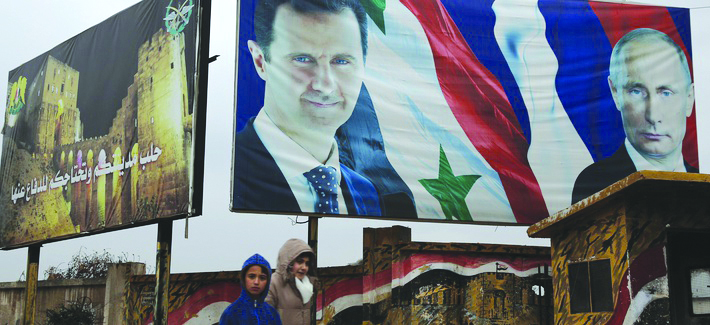
Leader of the Syrian regime Bashar al-Assad and Russian President Vladimir Putin in Aleppo – January 10, 2018 (defenseone)
Terminology of the political process:
“Political solution” or “political transition”
What is understood from the adherence of some countries to the term “political transition” and Russia’s insistence on the term “political solution” is the depth of meaning separating both terms. The significance of these key concepts resides in their use as prerequisites for any process that follows the political one, either reconstruction or the process of the return of Syrian refugees to their country.
The pursuit of the political solution went through three main phases from Geneva to Astana and then to Sochi in Russia. With each stage, the involved countries have different stances vis à vis the conditions and steps taken towards finalizing the political process.
The “political transition” is a gradual political process that allows the transition from a dictatorial regime to a pluralistic democratic rule that would be based on the freedom of choice and popular legitimacy expressed in free and fair elections; whereas, the definitions of a “political solution” varied following the countries that defined the term itself. Accordingly, the situation in Syria is defined as a political process that ensures the opposition’s sharing of power with the government of the regime while reducing the powers of the president.
The adviser to the Syrian High Negotiations Committee (HNC), Yahya al-Aridi, stated to Enab Baladi that for Russia, the term “political solution” varies according to its interests and the regime’s benefits.
Al-Aridi added: “For us, the European Union, the USA and some Arab and regional countries, including Turkey in particular, this means the implementation of international resolutions and political transition.” He explained that “the political transition means the real change that creates the safe environment for the refugees’ return and for reconstruction.”
The transitional phase usually requires years, whether represented in a “political transition” or a “political solution” which would be at the end concluded by the election of constitutional bodies that are supposed to have sovereign powers defined by the Constitution.
Both processes need factors that would help in their management and acceleration, including the appropriate economic situation and general atmosphere and the cessation of armed conflicts, as well as a preparatory process that precedes them.
In order to support its political solution, Russia has paved its way by several preparatory stages in order to impose it on the international scene. The first of these stages has been its control over the largest area of the country, along with the formal processes of “national reconciliation” under its “guarantees.”
The first talk about a political process leading to a political transition by the Syrians themselves was in Geneva, June 30, 2012, at a meeting of the Working Group on Syria at the request of Kofi Annan, the former Joint Special Envoy of the United Nations and the League of Arab States to Syria at that time.
According to the text of the transitional steps of the political process in Geneva: “The conflict in the Syrian Arab Republic will not end until all the parties ensure that there would be a peaceful way towards a common future for all in the country.”
The plan says that “any settlement must include clear and irreversible steps that would be adopted in the transitional process according to a specific timetable.” The mentioned main steps include the establishment of a transitional governing body that would be able to create a neutral environment in which the transitional process would move on, and that the transitional governing body would exercise full executive authority.
The body could include members from the current government, the opposition and other groups, and should be formed on the basis of mutual consent.
The plan adds that “Syrians are the ones who would decide the future of the country. All segments and components of society in the Syrian Arab Republic must be allowed to participate in the process of national dialogue. This process should not only be inclusive to all the people, but also effective; that is, its main results must be implemented.”
On this basis, “constitutional order and the legal system can be reviewed. The results of the constitutional drafting must be presented to the public referendum. Then, free, fair and pluralistic elections should be prepared and conducted to fill the newly created institutions and bodies after the establishment of the new constitutional order,” according to the plan.
After the Geneva Talks, the United Nations issued resolution 2245 in 2015, which consists of 16 articles. The fourth item provides for supporting a Syrian-led political process that would be conducted by the United Nations. The process would establish a credible, inclusive and non-sectarian rule within a six-month target period.
The resolution sets out a timetable and a process for the drafting of a new constitution. It also expresses its support for free and fair elections that would be conducted under the new Constitution within 18 months under the auspices of the United Nations.
The UN resolution affirms that there is no lasting solution to the current crisis in Syria except by a Syrian-led political process that would meet the legitimate aspirations of the Syrian people with the aim of fully implementing the Geneva Talks Declaration of June 30, 2012.
Russia moved “its own” political process to the Syrian National Dialogue Congress in Sochi, which was held in December 2018 and concluded with the agreement to form a constitutional committee of representatives of the Syrian regime and the opposition so as to reform the constitution in accordance with UN Security Council resolution 2245.
The final statement of the National Dialogue Congress in Sochi called for “the establishment of security and intelligence institutions that would preserve national security, would be subjected to the rule of law, act in accordance with the Constitution and the law and respect human rights.”
The third item of the final statement states that “the Syrian people alone have the right to determine their future through the democratic process and elections. They alone have the right to determine their political, economic and social rule without any external intervention or pressure, in line with the Syrian people’s rights and duties at the international level.
The Russian talks and the formation of a political solution have been accompanied by Russia’s control over the Syrian scene and the weakness of the European interaction, as well as its neutralization of the Geneva Talks path, which enjoys Western and international approval. However, Washington and some EU countries are still adhering to the Geneva Talks’ political path.
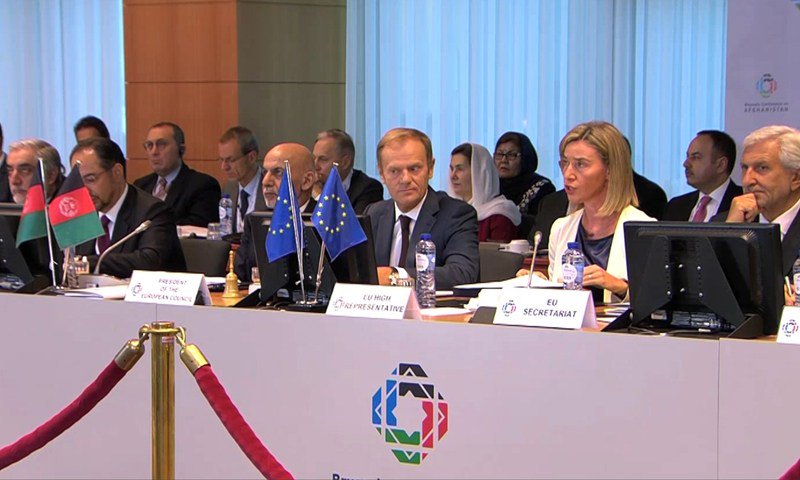
Brussels Conference on “Supporting the future of Syria and the region,” Wednesday April 5, 2017 (Twitter)
Except for al-Assad…
Cards that Russia may concede to collect funds for the reconstruction of Syria
International strife has surrounded the political process in Syria amid the Russian efforts to take control over all its sides, after the ally’s total control over the military and economic matters. Moscow has later been shocked with a reality preventing it from taking full control over the political matter, as Western countries linked Russia’s participation in the reconstruction process of Syria to the need to reach a political solution that would fulfill the interests of those countries before the Russian interests.
Since the Russian economy will not help President Putin and allow him to take responsibility of the reconstruction process of Syria without the participation of the Western countries, it was necessary for Russia to provide advantages to the international community in order to attract it towards opportunities for the reconstruction, but in a context that would preserve its interests and the “legitimacy” of its presence on the Syrian territory.
With the exception of verbal calls that were not successful, Russia launched its first seduction to the Western countries when it announced a plan to return 5.6 million refugees to Syria, trying to give the international community a heavenly opportunity and possibly an chance to get rid of the burden of refugees that has been overwhelming it, in return for obliging it to pay the necessary funds for the reconstruction of Syria.
However, it seems that the lack of the international community’s response to the returning of refugees plan, whose features and goals are still unknown, will force Russia to make further concessions in the Syrian matter, especially as the Russian plan coincided with Moscow’s failure to involve the world’s powerful countries in its reconstruction plans in Syria.
Will Russia bargain on the ruling regime?
From the point of view of the Syrian oppositionist, Firas al-Khalidi, a member of the Cairo platform, Russia has nothing in Syria to bargain on with the major powers except the ruling regime. He considered that the air and military presence and the use of advanced defense systems will not enable the Russians to tame the international community that can flip the course of the events in the field in few days, if it wanted to, according to al-Khalidi’s statements to Enab Baladi.
There are conflicting opinions about the concessions Russia might make in return for the Western countries’ participation in the reconstruction process of Syria. Some consider that Russia might give up on al-Assad in exchange for that, while others suggest that it is likely that what Russia would utmost allow is the Syrian opposition’s participation in the regime, in a way that would satisfy the Western countries, which is leaning towards the outputs of the Geneva Talks and not the Astana Talks.
Al-Khalidi thinks that Russians will not give up their sole card in Syria, which is maintaining al-Assad’s regime, as they believe that they derive the legitimacy of their presence in Syria from al-Assad’s remaining in power. Thus, Moscow will not give up on al-Assad before at least achieving all of its intervention goals, according to al-Khalidi.
Although Russia has been insisting on its refusal to oust al-Assad and his ruling regime, since its intervention in Syria, the Russian Deputy Foreign Minister Sergey Vershinin said in an interview with the Russian news agency Sputnik, on October 8, that the issue of al-Assad’s departure had been “overlooked and no one is discussing it anymore.”
He pointed out that the fate of Syrian President Bashar al-Assad would not be the subject of discussion in any future talks between the regime and the opposition. Thus, Russia has excluded the issue of changing the regime in Syria from any Western considerations, even if that has cost it the Western countries’ reluctance to participate in the reconstruction process.
However, the member of the Cairo platform of the Syrian opposition, Firas al-Khalidi, believes that the international community, led by the United States, is committed to its joint plan with the Russians, which is meant to bring peace to Syria, for no serious American attempt to break this agreement has been recorded up to now.
“Until now, the Russian side, whose perspective has gone beyond the Syrian context, is the party most concerned with presenting its credentials as a true international player and as a prominent part of the international system entitled to managing and resolving crises around the world,” he explained.
Al-Khalidi believed that Russia is aware that this test is the last chance for either an active return or a final exit from the international game. “Therefore, the rise of the Russian bet has upgraded the ruling regime to such high value,” al-Khalidi said.
A European opportunity to settle Russian accounts
The researcher Sokrat al-Alou believed that the European and Western countries may exploit the file of the reconstruction of Syria to solve unsettled international files with the Russians, including the Crimea in Ukraine, which Russia has annexed to its territory amid European denunciation, in addition to the Baltic Sea file and the Russian “harassment” of Scandinavian countries, as well as other complicated issues.
He added that in case Europeans decided to put these issues aside and focus on the Syrian file, the best solution Russia may offer is to share some of the power with the Syrian opposition following the course of “Geneva” and with the participation of all countries, away from both Astana and Sochi which marginalized any Western contribution to the Syrian political process.
However, al-Alou told Enab Baladi that the participation of the opposition would be formal, since al-Assad’s regime was the real ruler of the state institutions, while Russia would agree to share reconstruction with Turkey, Western countries and the United States, thus leading to a political solution.
“Neither the Syrian regime nor the opposition will have any real role in the reconstruction of Syria,” he said.
How does the Syrian community perceive Russian concessions?
In a poll conducted on Enab Baladi’s website, the views of the participants converged between those who felt that Russia might make concessions to the West in exchange for participating in the reconstruction of Syria, and those who believed that the Russian ally would remain committed to his vision of a political solution in Syria.
Enab Baladi asked the following question: “Do you believe that Russia would make concessions regarding the Syrian political file in return for the West’s participation in the reconstruction?” The number of respondents amounted to 450 people, and their opinion varied between “yes” and “no.”
56 percent of the respondents believed that Russia would abandon part of its interests in Syria, for being unable to finance reconstruction on its own. This indicates that this group of people still believes that Western countries will contribute to the Syrian solution, as opposed to what Russia and the regime have been promoting.
44 percent of the respondents stated that Russia will not give up managing the Syrian political file according to its own perspective, which contradicts with the international community. Therefore, this group of people relies on Russia, Iran and China to finance reconstruction projects in Syria.
International positions regarding the reconstruction process
Most Western countries and organizations support the approach of the United Nations, which strives to link reconstruction process to the political solution in Syria.
Russia started inviting Western countries to participate in the reconstruction after setting a plan that would allow the return of refugees to Syria months ago. However, these calls were met with the approval of Western countries which promoted for the political solution in Syria as a main condition.
The United Nations
The United Nations has put forward the political solution as a condition for facilitating the building and reconstruction of Syria, according to a document published by the newspaper Asharq al-Awsat last February, describing it as rare. This document, which has been introduced by the United Nations, tackled the contribution of its institutions to the reconstruction and the achievement of comprehensive and serious political transition.
The document mentioned that the United Nations will be ready to facilitate reconstruction only if there is a comprehensive, serious and negotiated political transition between the parties.
During his meeting with US Secretary of State Mike Pompeo last August, UN envoy to Syria Stephan de Mistura stressed the need for a political solution to the reconstruction project in Syria.
The two sides considered the talk about reconstruction in Syria as “untimely,” in reference to the work on the path of political solution and holding fair elections within the framework of UN Security Council resolutions, before urging the return of refugees to their country.
The United States
The United States announced in August that it would not provide any funding for the reconstruction of Syria before serious UN-led peace talks take place, referring to the Geneva path as a solution in Syria.
US Secretary of State Mike Pompeo stated in October that Washington would make no contribution to the funding of Syria’s reconstruction as long as there were Iranian or Iranian-backed forces in the country.
“We were clear; in case Syria does not guarantee the full withdrawal of the Iranian-backed forces, it will not get any dollar from the United States for reconstruction,” according to France-Presse Agency.
Last April, the US House of Representatives passed a bill banning any assistance in the reconstruction of regime-held areas, in exchange for the implementation of a political solution in Syria.
The European Union
Federica Mogherini, High Representative of the European Union for Foreign Affairs, announced in September that the European Union has some conditions in order to contribute to reconstruction, notably a political solution characterized by international legitimacy and a draft of a new constitution with the participation of the international community.
Mogherini pointed out that the commitment to support Syria and reconstruction should not be limited to the material side.
The Group of Seven (G7)
The Group of Seven (the United States, Canada, Japan, Britain, France, Germany and Italy) announced in April that it would not participate in the reconstruction of Syria without a “credible” political transition of the ruling regime.
Germany
In June, German Chancellor Angela Merkel stated that “Germany will not participate in the reconstruction process in Syria unless there is a political solution to the political and security crises in the two countries as well as the return of stability to both of them,” according to al-Ghad newspaper.
After a meeting held between Putin and Merkel, the spokesman for the German government, Steffen Seibert, stated that a “political peace agreement” must be reached Syria.
France
The French ambassador to the Security Council, François Delattre, said last July that his country would not participate in the reconstruction of Syria unless “a genuine political transition is carried out with two constitutional and electoral processes in a serious and meaningful manner.” He added that political transition is a prerequisite condition for stability in Syria. Delattre insisted that there is no reason for France and the European Union to fund reconstruction efforts.
Saudi Arabia and the UAE
Moscow has received “strong promises to contribute to the post-war reconstruction of Syria” during a visit the Saudi King Salman bin Abdulaziz paid to Moscow in October 2017, according to the London-based newspaper al-Arab.
The newspaper pointed out that King Salman told Russian President Vladimir Putin that Riyadh could not pay billions of dollars to serve Iran, and that any talk about reconstruction should be held after finding a political solution where Syrians will be the decision makers without any external interference of any party.
In August, Saudi Arabia and the United Arab Emirates offered $150 million for the sake of reconstruction and stability in eastern Syria (controlled by Syrian Democratic Forces), particularly in the city of Raqqa, according to the International Alliance.
Turkey
Turkey announced last February its willingness to participate in the reconstruction of Syria, according to the Turkish Minister of Foreign Affairs Mevlüt Çavuşoğlu.
According to the Turkish news agency Anadolu, Çavuşoğlu stated that “we are ready to participate in the reconstruction of Syria, but the countries wishing to cooperate with us must adhere to transparency and honesty.” Turkey adheres to al-Assad’s departure as a prerequisite condition for a political solution in Syria.
if you think the article contain wrong information or you have additional details Send Correction
النسخة العربية من المقال
-
Follow us :












 A man riding his motorcycle through the wrecked buildings in Harasta, East of Damascus. (AFP)
A man riding his motorcycle through the wrecked buildings in Harasta, East of Damascus. (AFP)





 A
A
A
A
A
A
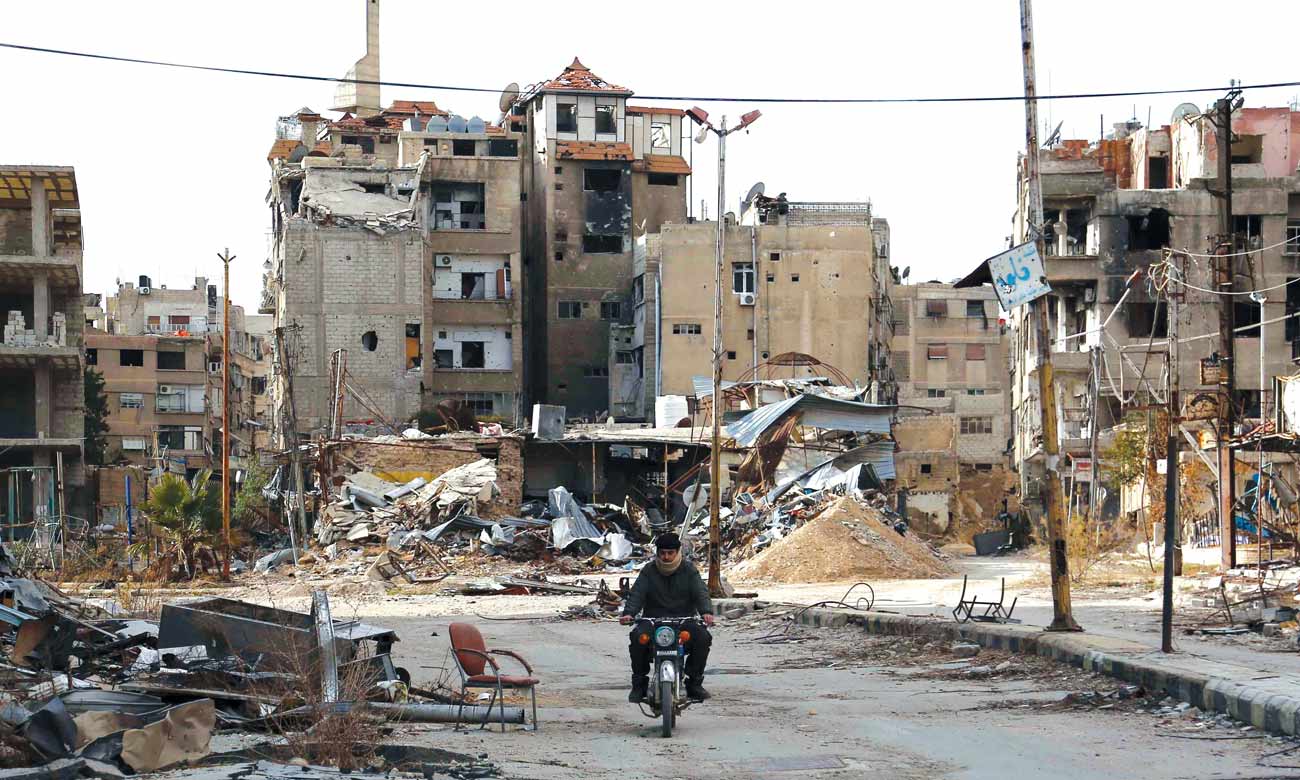
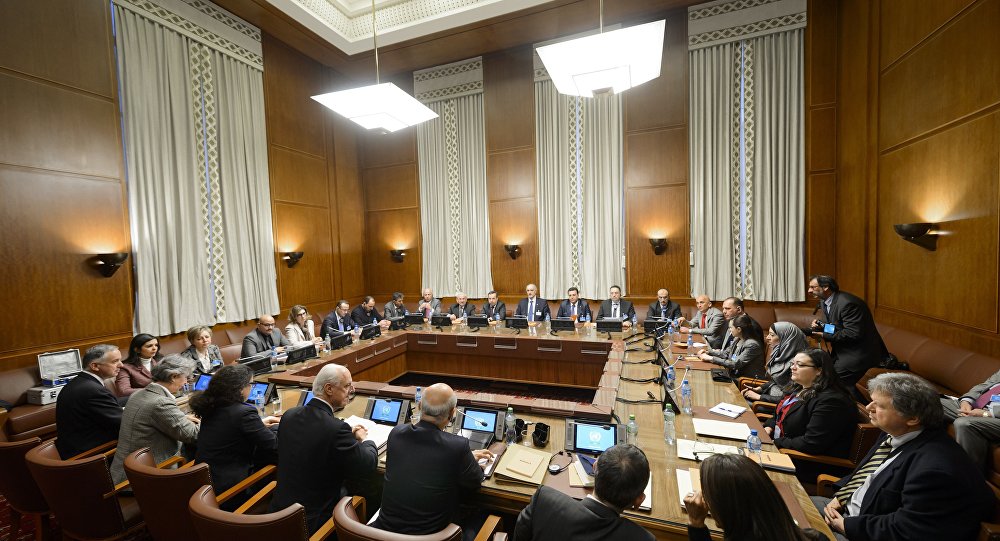
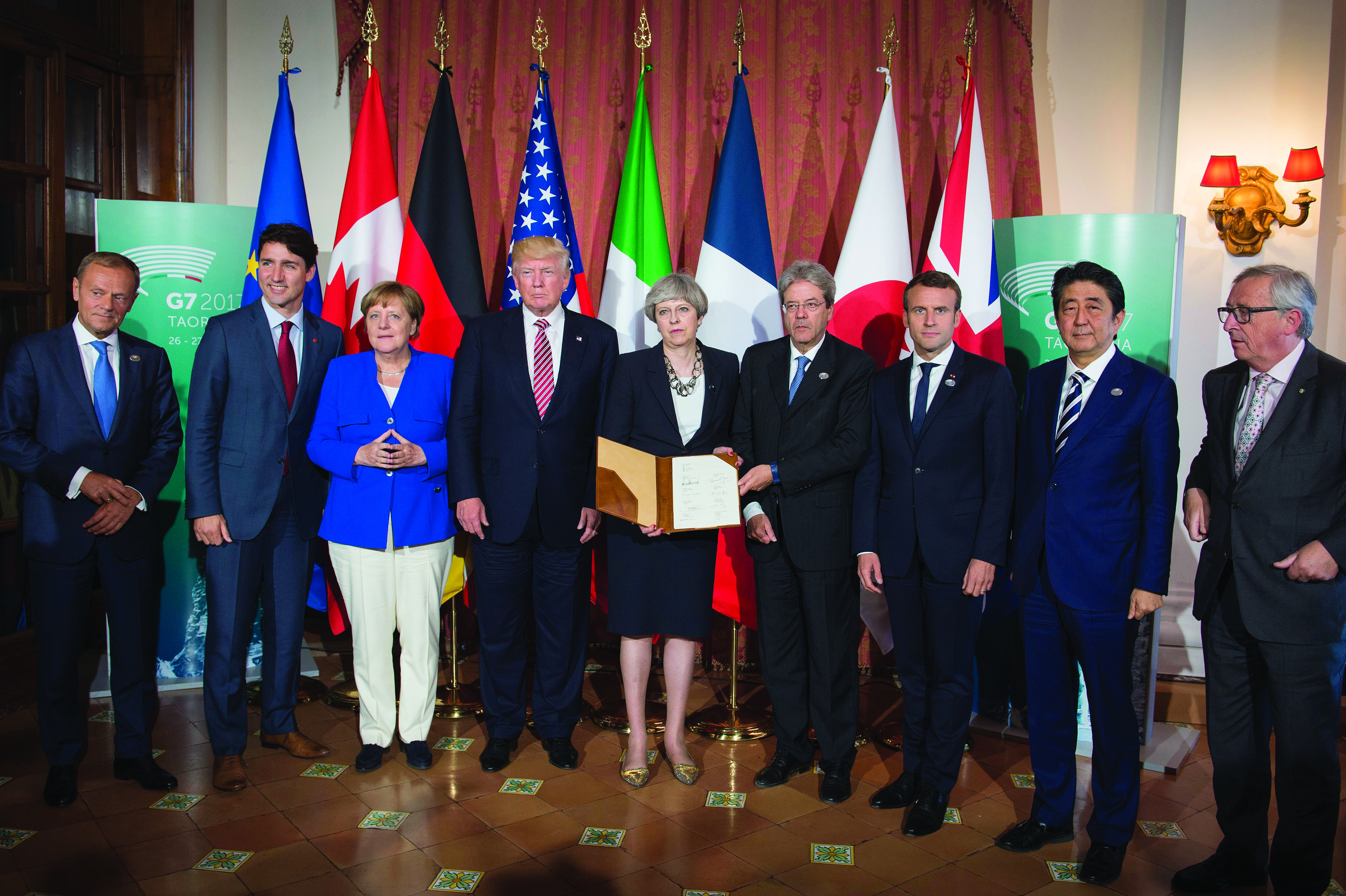







 More In-Depth
More In-Depth